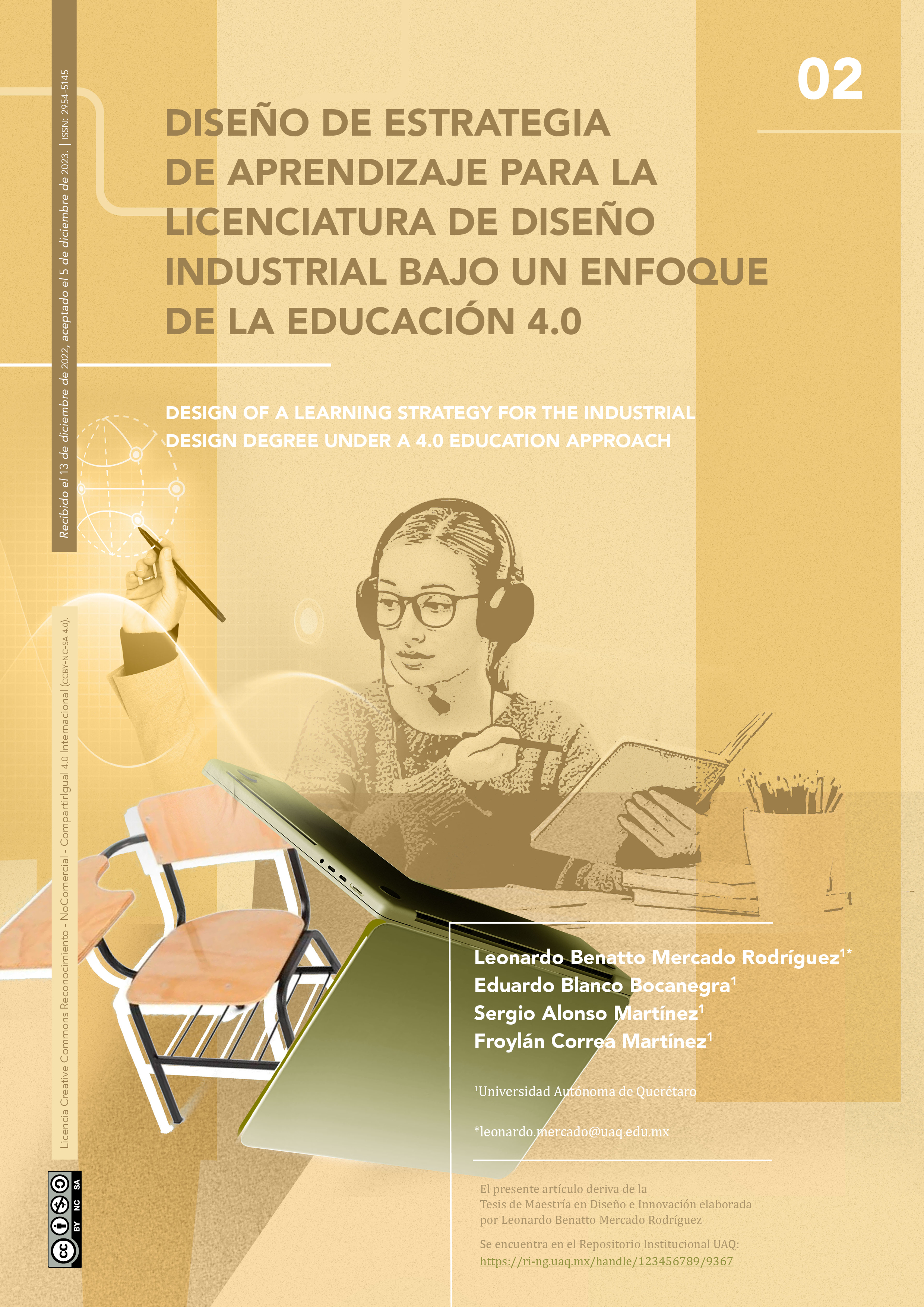Abstract
This work presents the experimental implementation of a learning strategy based on Education 4.0 in students of the Industrial Design Degree (LDI) at the Autonomous University of Querétaro (UAQ). A comparison is made between a self-learning methodology using audiovisual media and the Google Classroom platform against the traditional model still prevalent in the curriculum. Information was gathered through two interventions in which a design project was presented from the theoretical-practical approach of the ldi. The groups were segmented through a random selection process of the participants. The results favored the traditional method; however, based on feedback from teachers and students, it was concluded that a hybrid method could be the most efficient alternative to achieve better learning performance.
References
Akmanova, S., Anisimov, A., Bondarenko, T., Kameneva, G., Kopylova, N. y Chernykh, O. (2019). Un concepto educativo para los medios del desarrollo continuo de la preparación individual de autoaprendizaje de por vida. Revista Dilemas Contemporáneos: Educación, Política y Valores, edición especial. https://dilemascontemporaneoseducacionpoliticayvalores.com/index.php/dilemas/article/view/1362
Baño Hernández, M. (2010). El diseño industrial: nuevos aspectos funcionales, estéticos y simbólicos de los productos de consumo. Madrid. CEU Ediciones.
Cataldi, Z. y Dominighini, C. (2015). La generación millennial y la edu- cación superior. Los retos de un nuevo paradigma. Revista de Informática Educativa y Me- dios Audiovisuales, 12(19), 14-21.
Ebojoh, O. y Xu, H. (2007). Effectiveness of online learning program: A case study of a higher education institution. [Archivo PDF], 8(1), 160-166. http://doi.org./10.48009/1_iis_2007_160_166
Elisondo, R. (2018). Creatividad y educación: llegar con una buena idea. Creatividad y Sociedad (27), 145-166. https://ri.conicet.gov.ar/ handle/11336/98611
Fisk, P. (2017). Education 4.0. The future of learning will be dramatically different, in school and throughout life. https://www.peterfisk.com/2017/01/future-education-young-everyone-taught-together/
Flores, A., Rodríguez, J. y Chávez, G. (2019). La transformación de la educación básica en México desde la perspectiva de la Educación 4.0. En Pérez- Aldeguer, S. y Akombo, D. Research, technology and best practices in education (pp. 103-11), Paises Bajos: Adaya Press.
Hussin, A. (2018). Education 4.0 made simple: Ideas for teaching. International Journal of Education and Literacy Studies, 6(3), 92-98. http://dx.doi.org/ 10.7575/aiac.ijels.v.6n.3p.92
Kozinsky, S. (2017). How generation Z is shaping the change in education. https://www.forbes.com/sites/sievakozinsky/2017/07/24/how-generation-z-is-shaping-the-change-in-education/#304059746520
Larbi-Siaw, O. y Owusu-Agyeman, Y. (2017). Miscellany of Students’ Satisfaction in an Asynchronous Learning Environment. Journal of Educational Technology Systems, 45(4), 456-475. https://doi.org/10. 1177/0047239516667499
Morse, K. (2003). Does one size fit all? Exploring asynchronous learning in a multicultural environment. Journal of Asynchronous Learning Networks, 7(1), 37-55.
Rojas, D. y Camejo, M. (2010). Niveles de asimilación y niveles de desempeño cognitivo: refle- xionemos. Mendive, 8(1), 65-71.
Universidad Autónoma de Querétaro (2015). Proyecto de Reestructuración de la Licenciatura en Diseño Industrial 2015. México, Querétaro.
Universidad Autónoma de Querétaro (2017). Modelo Educativo Universitario. https://planeacion.uaq.mx/index.php/modelo-educativo-universitario
World Economic Forum (2020). Schools of the Future Defining New Models of Education for the Fourth Industrial Revolution. [Archivo PDF]. http://www3.weforum.org/docs/wef_Schools_of_the_Future_Report_2019.pdf

This work is licensed under a Creative Commons Attribution-NonCommercial-ShareAlike 4.0 International License.
Copyright (c) 2024 SketchIN


